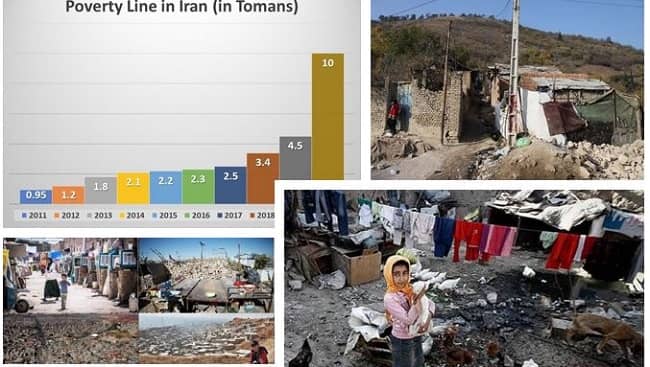Iranian state-run media gives a glimpse into the people’s worsening economic situation prior to the Iranian New Year (Nowruz), with poverty and skyrocketing prices meaning that they cannot afford food, forced to buy bread on credit.
The state-run Resalat daily wrote at the end of last month: “More than 50% of the country’s population suffers from low wages and cannot afford food, let alone housing, clothing, travel, medicine, and treatment, or education.”
The regime gives out some subsidies but its only about $1.80 per month per person who qualifies, which is just enough to buy a kilo of fruit, and doesn’t nearly make up for the inflation rate. Even the traditional Nowruz treat of nuts is 298 thousand tomans per kilo.
But why is the country in such a state?
The poverty line is roughly 10 million Tomans, while many workers earn about a third of that. Millions more have not received their wages in months and so many more are unemployed. All of this can be traced back to corruption and mismanagement by the mullahs, including the printing of excess money to fund the budget, which then causes inflation.
They are stealing Iran’s wealth to fund war and terrorism abroad, to line their own pockets, and to create a nuclear weapon. This is back up by the Iranian Resistance and many former regime officials.
Former Chairman of the National Security and Foreign Policy Commission Heshmatullah Felahatpisheh reported that the regime paid up to $30 billion to prolong the war in Syria and keep dictator Bashar al-Assad in power. While former MP Hassan Sobhani admitted that 65-70 million people are reliant on subsidies of 45,000 tomans and that this means that the regime has left the country in “poverty”.
Leading cleric Fazel Meibodie said that hungry people cannot be “suppressed” any longer and that, while repression may temporarily stop an uprising, the people will soon rise up.
The Iranian Resistance wrote: “The regime’s actions have increased society’s restiveness. Daily protests by all walks of life, the uprising in Sistan and Baluchistan, and three nationwide uprisings in the last three years have shown the Iranian people do not want this regime. The regime has been able to oppress people momentarily, but the situation has reached a point that oppression no longer works. It only increases people’s hatred toward the regime…. In simple words, the regime sows the wind and will reap the whirlwind.”
